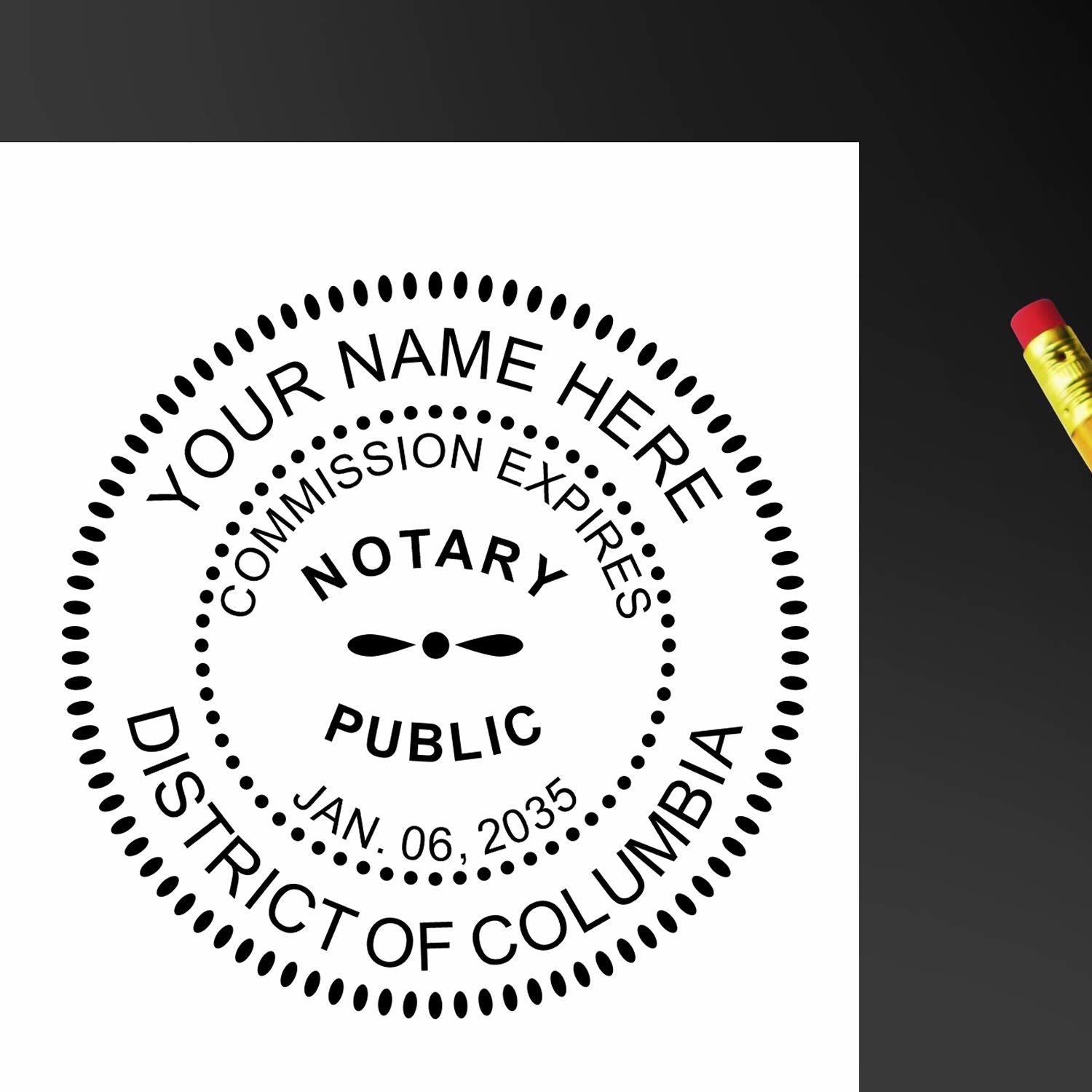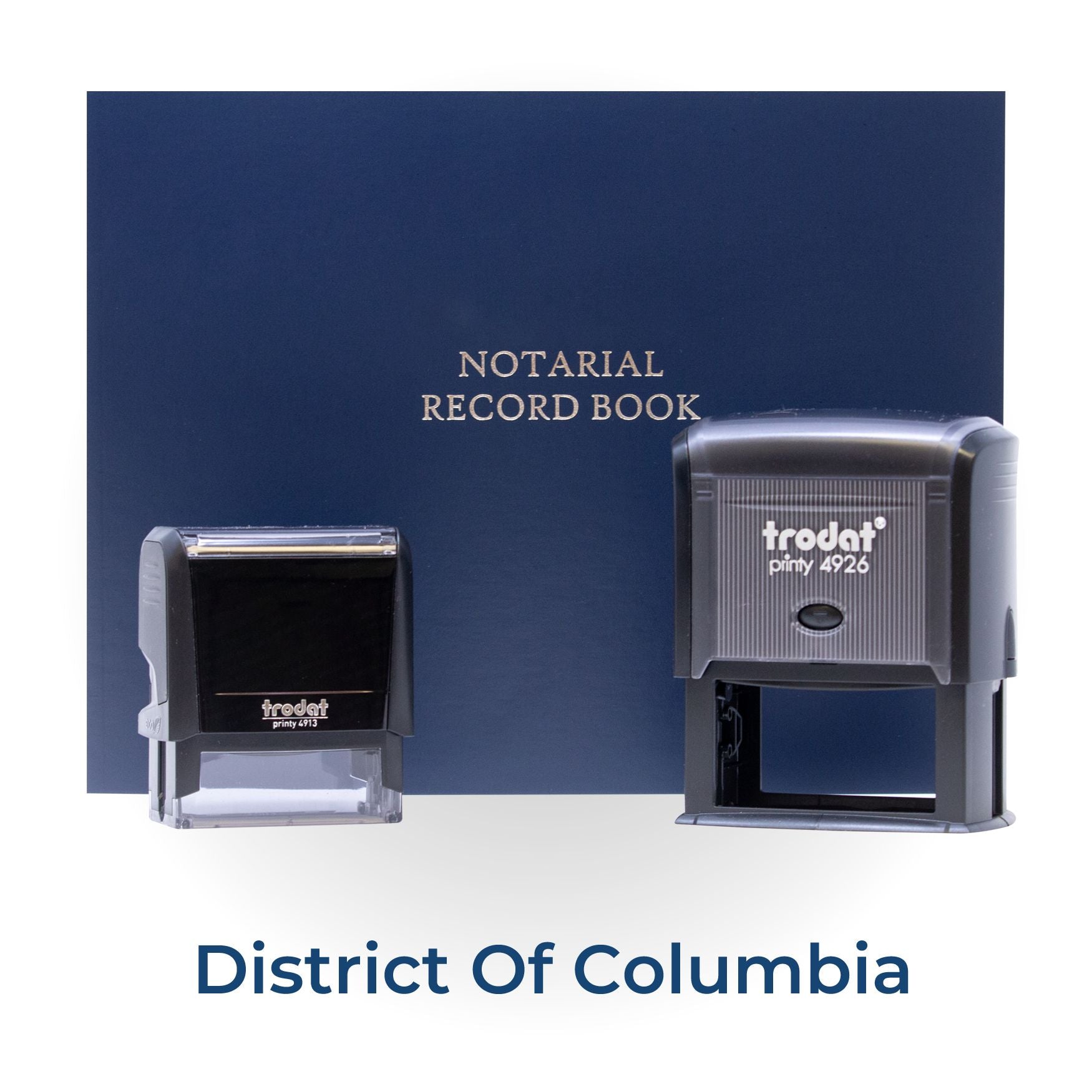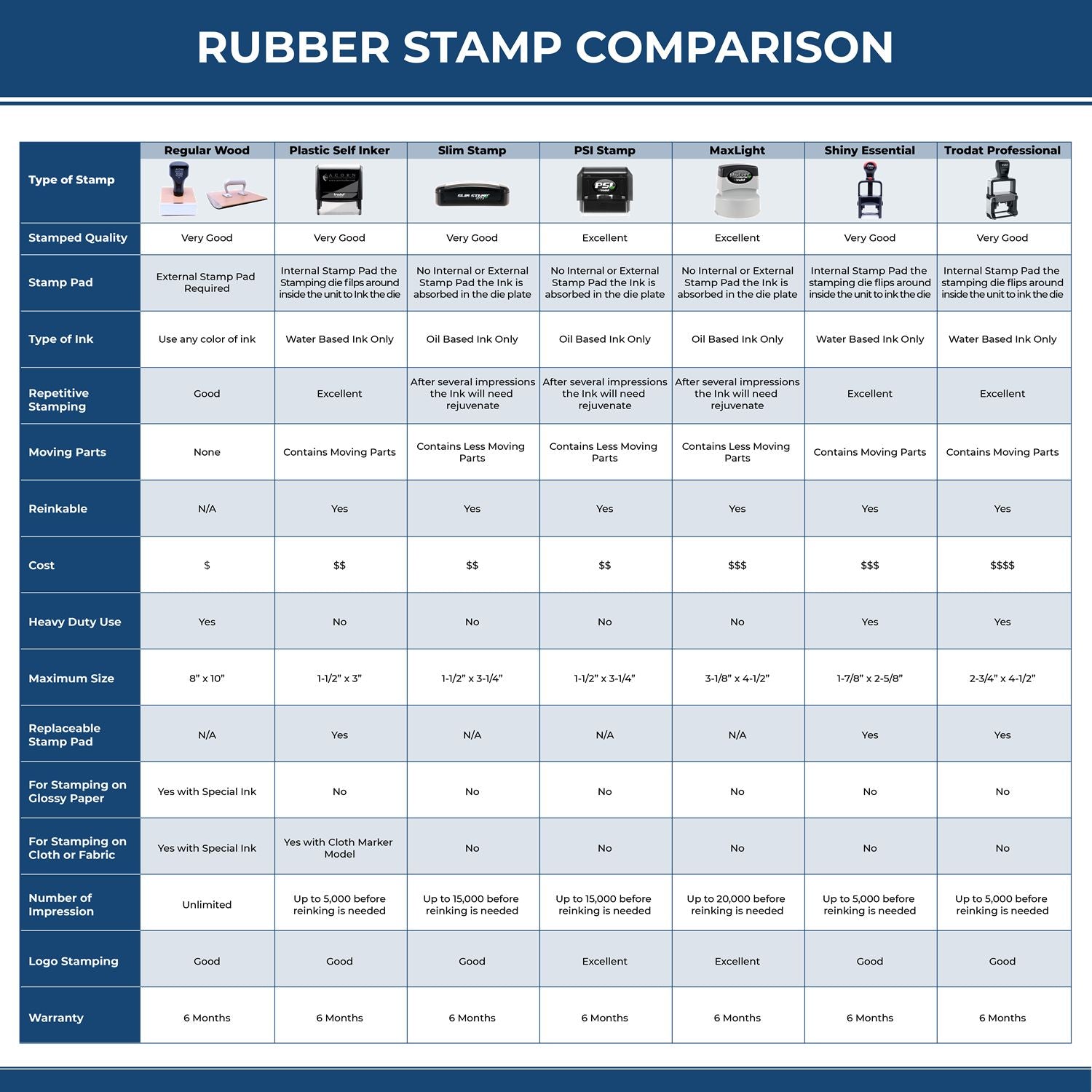Understand The Basics Of Your Notary Stamp
Choosing a notary stamp for District of Columbia duties can feel like too many details all at once. You might wonder which design is best, whether you need certain ink colors, or how to handle state-specific requirements. You’re in the right place. This guide walks you through the essentials, so you can shop confidently and fulfill your notarial responsibilities without worry. Precisely matching the District’s regulations is key, and paying attention to the practical features of your stamp makes your day-to-day tasks simpler. By the time you finish reading, you’ll know how to pick a dependable notary stamp, which extra supplies you might want, and how to keep it all organized.
Know The District Of Columbia Regulations
Before you pick a stamp design or choose from assorted handle colors, it’s vital to understand the official rules for notaries in the District of Columbia. Regulations can change from one jurisdiction to another, and you don’t want to end up with a stamp that doesn’t comply. Generally, your stamp must include your name as it appears on your commission certificate, along with your title and commission expiration date. Some stamps also incorporate the District’s official seal for authenticity.
- Double-check the exact wording needed on your stamp.
- Know your commission expiration date to ensure accuracy when ordering.
- Follow any size or color specifications from the District of Columbia.
Ignoring these regulations can lead to headaches down the road, possibly invalidating notarized documents or even risking your notary status. So, bookmark the relevant guidelines or keep them handy. They’ll help you confirm that your final stamp choice ticks every box.
Consider Additional Supplies Beyond The Stamp
A complete notary toolkit goes beyond just your stamp. When you handle a diverse range of documents—property deeds, affidavits, power-of-attorney forms, and more—you might need a few companion items. Think about embossers, ink refills, notarial journals, and protective carrying cases. Stocking up on supplies keeps you prepared for any notarization scenario.
- Notarial journals allow you to record each transaction.
- Embossers can add a raised seal for a polished look.
- Spare inks and clear covers make sure your stamp stays sharp and clean.
For one-stop shopping, check out district of columbia notary supplies. You’ll find not only stamps but also complementary products that help you stay organized.
Choose The Right Stamp Design
Once you’ve got regulations sorted, it’s time for the fun part: choosing the perfect design. Your notary stamp must meet legal standards, but it can still reflect your preferences. The shape, size, and style should make stamping fast and straightforward, especially if you perform notarizations several times a day.
Round Versus Rectangular Stamps
Two popular options surface repeatedly for active notaries: round stamps and rectangular stamps. Some notaries love the classic look of a round seal. Others find rectangular stamps easier to line up on documents. One isn’t inherently better than the other; it boils down to legal requirements and your personal preference.
- Round stamps often include decorative borders.
- Rectangular stamps can fit lengthy text if you have a longer name or additional details.
- Both styles can be self-inking or pre-inked, giving you a choice in how you stamp.
Review your typical documents to see which shape would fit better. If you do mostly letter-sized contracts, the space for your seal might be generous, making larger rectangular stamps feasible. If you frequently handle smaller forms, a compact round or rectangular design might be more comfortable.
Self-Inking Versus Pre-Inked
Once you settle on a shape, consider the inking method. Self-inking stamps come with a replaceable ink pad inside the stamp housing. Each press re-inks the stamp, making them a breeze for repeated use. Pre-inked stamps, on the other hand, have ink embedded in the stamp’s surface. They typically deliver crisp, clean impressions and last through thousands of impressions before re-inking is needed.


- Self-inking: Quick re-inks, user-friendly, often slightly bigger.
- Pre-inked: Ultra-sharp impressions, compact design, might cost more upfront.
If you notarize documents multiple times a day, a self-inking stamp can save time. If you prioritize impeccably precise impressions, a pre-inked stamp is a worthwhile upgrade.
Make Sure You Have Long-Lasting Materials
Your notary stamp is integral to your work, so you don’t want something that breaks down after just a few months. High-quality stamps rely on durable plastics or sturdy metals. Also, keep an eye on the handles or internal mechanisms. If they’re cheaply made, you’ll notice wear and tear sooner than you like.
Look For Quality Construction
When you press your stamp onto a stack of legal forms, you need assurance it won’t slip, crack, or fail to deliver a crisp impression. Notary stamps that feel lightweight, flimsy, or rickety in your hand are unlikely to perform well over the long haul.
- Metal frames offer stability and precision.
- Reinforced plastic stamps are lightweight but durable.
- Ergonomic grips reduce hand strain when you’re stamping multiple documents.
Use A Trusted Supplier
The District of Columbia has unique guidelines, so it’s critical to work with a supplier who knows your region inside and out. That’s where Engineer Seal Stamps comes in. With more than 60 years of experience in crafting seals, stamps, and other official embossing tools, this team makes sure you get a stamp that meets District regulations. Plus, you enjoy a quick turnaround time that can be a lifesaver if you’re tight on deadlines.
Get A Free Digital Stamp With Purchase
One extra perk at Engineer Seal Stamps is the free digital stamp included with your purchase. This digital version can come in handy for electronic filings or for attaching to digital documents, which is becoming more common in today’s world. You’ll have a backup solution for those times when physical stamping isn’t enough. It’s one less expense to budget for down the road.
Benefit From Fast Service
If you’re anxious to start notarizing and can’t wait around for weeks, fast service is non-negotiable. Engineer Seal Stamps aims for quick order processing and shipping, getting your stamp into your hands in as short a time as possible. Whether you’re renewing your commission or starting from scratch, knowing your supplies will arrive promptly is a major stress reliever.
Tailor Your Ink Color And Style
You may wonder whether black ink is the only option allowed for a District of Columbia notary stamp. In many cases, black is standard and widely accepted. However, if your District guidelines permit other colors, you might choose blue or purple to reduce the risk of confusion with photocopies or scanned documents. Always confirm color requirements before finalizing your pick.






- Black is universally recognized and standard.
- Blue helps differentiate an original document from a photocopy.
- Colored ink can offer a distinctive look, but verify your commission rules.
When deciding, consider how your stamp impressions will show up on scanned or faxed copies. Some colors might lose clarity. A standard black or blue often remains the safest bet for maximum legibility.
Keep Track Of Your Commission Expiration
In the District of Columbia, you’ll see your commission expiration date printed on the official notary certificate. This date must appear on your stamp. Be mindful of when your commission is up for renewal. If you pass that date, you could be in violation of state law by using an outdated stamp. Order your notary seal soon after receiving your updated commission, ensuring the date is correct.
Update Your Stamp Before Renewal
If your commission’s renewal date is around the corner, consider ordering a fresh stamp so you’re prepared the moment your new certificate arrives. Double-check that your new stamp includes the updated date, preventing any confusion or invalid notarizations. Nobody wants to reorder a second stamp simply because they forgot to align the commission dates.
Practice Proper Usage And Maintenance
After you’ve chosen the right notary stamp for District of Columbia duties, keep it in top shape. Cleaning and storing it properly ensures every impression comes out clean and professional. You also minimize the risk of accidental damage or ink leaks in your briefcase.
- Regularly test your stamp on scrap paper to check for dryness or uneven inking.
- Store it in a cool, dry place where the stamp pad won’t dry out.
- Refill or replace self-inking pads or pre-inked cartridges when impressions fade.
Maintaining your stamp is similar to caring for any professional tool. A few extra minutes now can prevent frustrating mishaps later, especially in front of clients.
Stay Organized With A Notary Kit
Between the stamp, your notarial journal, spare ink pads, and any embosser you might have, you may feel buried under supplies. Consider organizing everything in a small travel case or a dedicated drawer at your desk. That way, you won’t be searching through piles of papers every time someone hands you a document to notarize.
Keep A Checklist Handy
Especially if you’re new to this line of work, you can create a quick checklist to ensure you don’t miss any steps:
- Verify the signer’s identification.
- Check the document for completeness.
- Confirm your stamp is properly inked.
- Document the transaction in your notarial journal.
- Apply your stamp or embosser with care.
A consistent routine reduces the odds of a notarial slipup, which can save you time and hassle down the road.
Compare Costs And Value
It’s tempting to buy the cheapest notary stamp you can find, but be careful. The least expensive option may not come with a sturdy frame or high-quality ink. And if it wears out quickly, you’ll end up spending more to replace it. Think about the long-term value. You might pay a little more for a brand with a solid reputation—like Engineer Seal Stamps—but you gain peace of mind that your equipment will last. Add in perks like a free digital stamp, and you can see how the initial cost balances out over time.
Budgeting For Extras
Beyond your stamp, factor in the cost of any additional supplies. If you need an embosser, special carrying case, or replacement ink pads, roll those into your budget so there are no surprises. A quick online glance at bundled options or starter kits might save you money in the long run.
Remember To Renew On Time
Mark your calendar for your commission’s renewal date, because letting your commission lapse causes all sorts of complications. You’d have to pause your notarial services, which can turn away clients, and you risk potential legal issues if you accidentally stamp documents after your commission has expired. Staying current assures everyone that your notarizations are valid.
Coordinating With The District
In most cases, renewing your commission involves submitting specific forms, updating your information, and paying a renewal fee. The District of Columbia might send reminders, but it’s best not to rely solely on that. Keep your own notes in your planner or on your phone’s calendar. Doing so helps you start the process well before the expiration date.
Final Thoughts And Next Steps
Selecting the right notary stamp for District of Columbia is no small matter, but it doesn’t have to be overwhelming. By confirming you follow local requirements, picking a stamp design that fits your daily workflow, and working with a trusted supplier, you’ll streamline your entire process. Engineer Seal Stamps provides quick service, a free digital stamp, and over 60 years of expertise, so you know you’re in good hands.
Once you have your stamp and any extras like notarial journals or embossers, maintaining them properly completes the picture. Keep your workspace tidy, renew on time, and you’ll find the notarization routine is a breeze. After all, a smooth process means happier clients, fewer errors, and peace of mind for you. Ready to take that next step? Check out district of columbia notary supplies to get started today.
Frequently Asked Questions
Do I Need Both A Stamp And An Embosser For District Of Columbia Notarizations?
Not necessarily. Some notaries prefer to use an embosser for a more official look, but the District of Columbia primarily requires a rubber stamp with the correct information. If you enjoy the professional touch of an embosser, you can use both.How Often Should I Refill Or Replace My Stamp Ink?
You’ll know it’s time for a refill or replacement when your stamp impressions start looking patchy or faint. For those who deliver many notarizations each week, you might need a refill every few months. Self-inking stamps can have their pads replaced, while pre-inked models require new ink cartridges.Am I Allowed To Use Color Ink Other Than Black?
In many cases, yes, as long as the color is clearly visible on official documents. However, always double-check your local regulations. Black or blue ink is usually the safest choice for clarity, especially when documents are scanned or copied.Can I Keep Using My Stamp If My Commission Expires Next Month?
You can use your stamp until the expiration date on your commission. Once that date passes, you need to renew your commission. After renewing, you’ll need an updated stamp that reflects the new expiration date to stay in compliance.









































